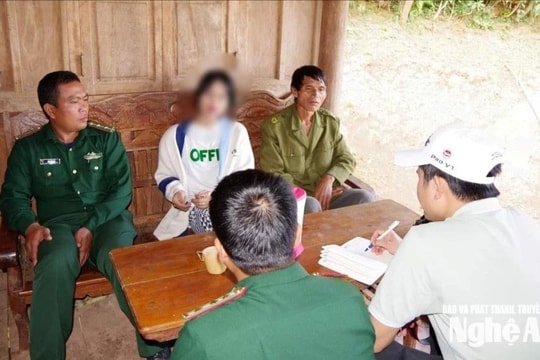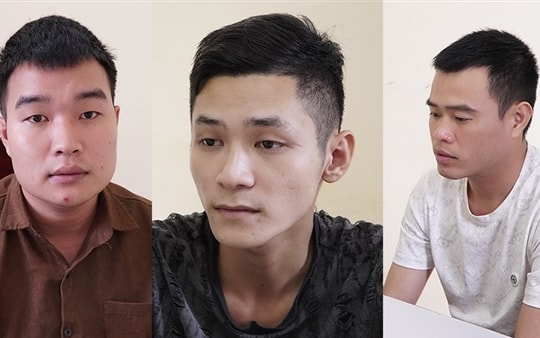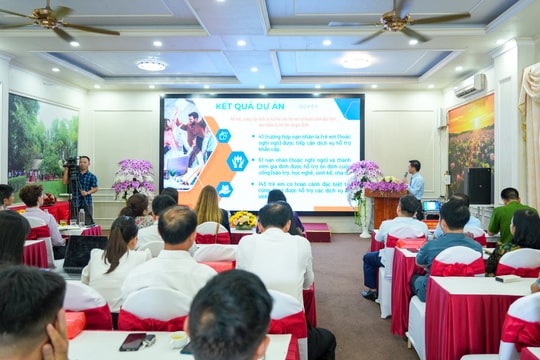Preventing and combating human trafficking: Raising public awareness, synchronizing many solutions
In recent times, local authorities and functional agencies have implemented many solutions to propagate, prevent, control and neutralize the causes and conditions that give rise to human trafficking crimes. However, this situation still has many complicated developments that require synchronous intervention.
The reality of human trafficking
Currently, the lives of a part of the population, especially in remote areas in Western Nghe An, still face many difficulties. People's awareness of the law is still limited; unemployment, especially among young people, is still common... These are factors that criminals who buy and sell people often take advantage of to lure, entice, and deceive women and children to buy and sell for illegal profits.
.jpg)
Notably, recently, human traffickers often use social networks (Zalo, Facebook, Telegram...) to find ways to attract and deceive victims with the method of "easy work, high salary". They trick victims into going to Laos and Cambodia to sell them to criminal gangs to conduct fraud in cyberspace or online gambling.
.jpg)
In particular, human trafficking crimes often operate in rural and mountainous areas of our province, where the population has low education levels, economic difficulties, many unemployed and gullible people, etc., so they are easily lured, enticed, and deceived.
The criminals are mainly women who have worked and lived abroad, such as in China, then returned to their local areas and colluded with some local people in remote, isolated, and border areas to form closed networks to lure and deceive women and children into being sold abroad for profit; or have been victims of human trafficking abroad.
Victims of human trafficking are mainly children and women from particularly difficult family circumstances or women who are "past their prime"; young girls who want to escape their local agricultural work, hoping to find leisurely work with higher income; others are children without adult supervision... Those victims are often taken to China to get married or work as prostitutes.
In addition, recently, human trafficking crimes have targeted young workers who are looking for jobs abroad with high salaries, then lured victims to go to intermediary countries to be taken to autonomous regions in Laos, Cambodia, Myanmar... and forced to commit crimes such as: Fraudulent appropriation of property, gambling... If they do not comply, the victims will be abused by the subjects.
Continuing efforts to prevent human trafficking
Recently, the Social Work Center has received and supported 3 victims of human trafficking (1 boy, 2 women from Ha Tinh and Quang Binh). Currently, the child is still being cared for and raised at the center, the 2 women have been welcomed by their families and are receiving support policies according to the law.
.jpg)
The center also received 19 victims from Cambodia through bilateral handover and repatriation. After being repatriated from neighboring countries or after being rescued by functional forces, the police and border guards conducted verification procedures according to regulations, organized reception, and provided initial support such as travel expenses, or officers directly took the victims back to their localities.
.jpg)
During the period from 2021 to 2025, Nghe An provincial authorities received and provided initial support to 96 victims of human trafficking who returned to their localities.
Currently, in Nghe An province, there is one facility with the function and duty to receive and support victims of trafficking. Victims who wish to stay here will receive support services according to the law and will be transferred if the victim has a need.
From the practice of prevention and combat, it is shown that, in addition to some cases of being deceived, there are cases where victims in human trafficking cases accept to go to China to get married in order to earn some money, therefore, when not yet discovered, they do not cooperate and report to the police; some cases where the victims do not report due to inferiority complex or the victims are abroad, so the investigation and expansion of the fight encounter many difficulties.
In many human trafficking cases, due to language barriers, the victims cannot determine the location of the victims to coordinate rescue efforts; when luring the victims abroad, there are only the victims and the subjects, no witnesses.
In cases where the offender is identified and evidence is found to prove the crime but the victim is not identified (because the victim is still abroad), the judicial sectors in many localities are still not unified and are still confused in handling the case.
Crimes of human trafficking often form tight-knit networks and organizations, scattered in provinces across the country, even abroad, with very sophisticated and cunning methods of operation, making it difficult to organize arrests and handle cases; propaganda and education work in the community faces many difficulties, especially propaganda for people in remote areas, ethnic minority areas, and mountainous areas due to obstacles in terms of travel conditions, propaganda methods and people's awareness.
The documents and procedures to receive support according to the law are still complicated. In some cases, foreign authorities often do not identify or classify each repatriated subject, or the victims do not have enough evidence to prove that they are victims.
The level of support for returning victims of human trafficking is still low; some victims do not know about the State's support policies because they do not have access to information sources.
The length of stay of victims at the Social Work Center is short (60 days), so initial psychological counseling, needs assessment, and understanding of the victims' circumstances and relatives in the initial reception facilities and victim support facilities are still difficult.
Identifying the work of preventing and combating human trafficking as a key, urgent, regular and long-term task that requires focused and drastic direction, the People's Committee of Nghe An province requested departments, branches and localities to arrange and mobilize legal resources for the work of preventing and combating human trafficking crimes commensurate with the requirements and tasks in the new situation.
At the same time, propaganda and warnings should be given to people in remote areas about the risks they may encounter when falling into the trap of human traffickers. That is, they need to carefully research invitations to make friends, go on trips, or introduce easy jobs with high salaries; refuse firmly when they see something unusual; consult at least 3 trustworthy people before making a decision; regularly update the situation with relatives and friends when working far away; prepare addresses and reliable phone numbers when needing help such as: National switchboard - hotline for prevention and combat of human trafficking, number 111.





